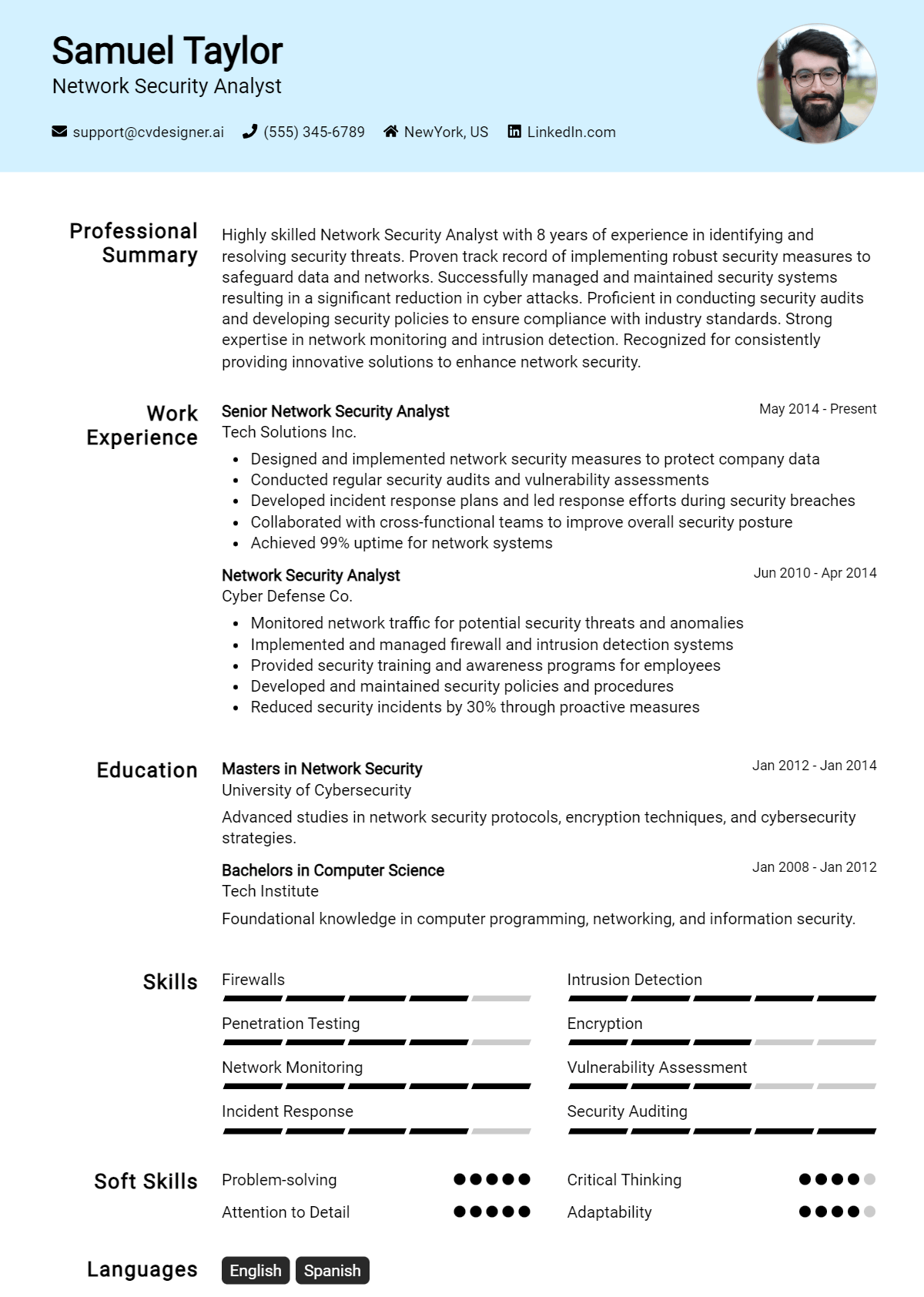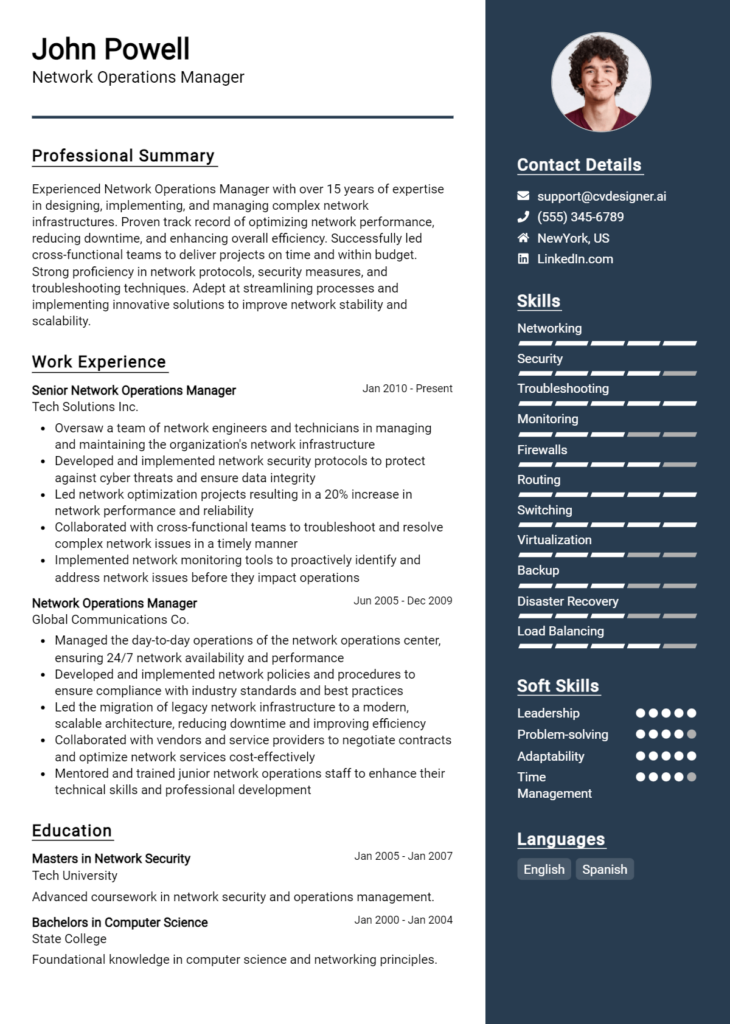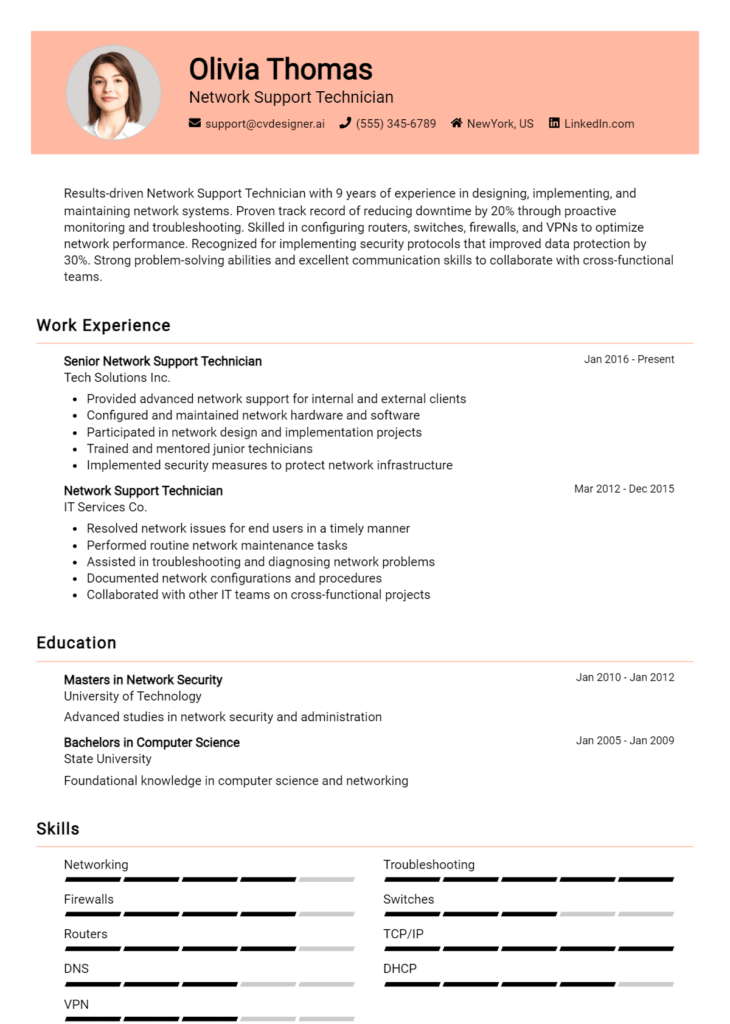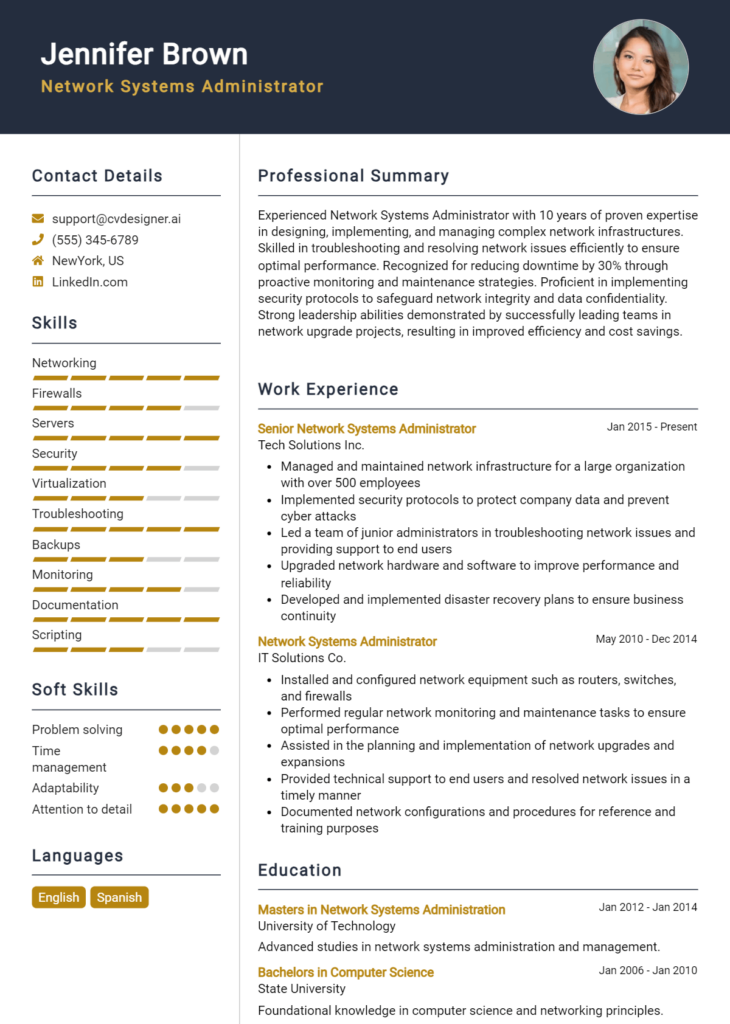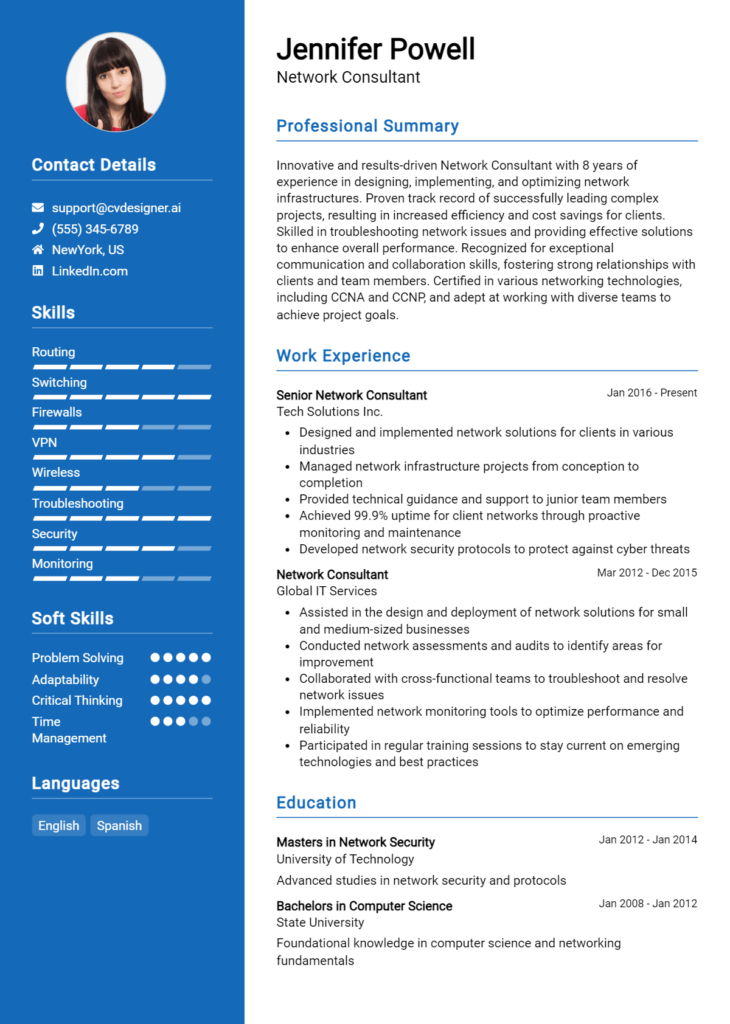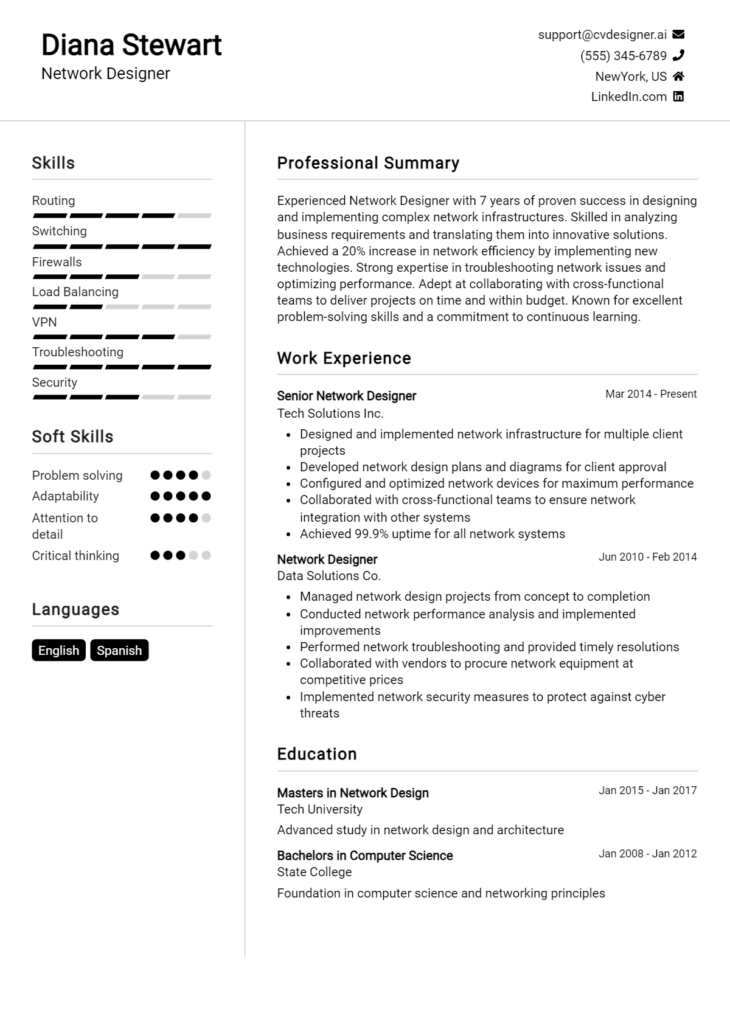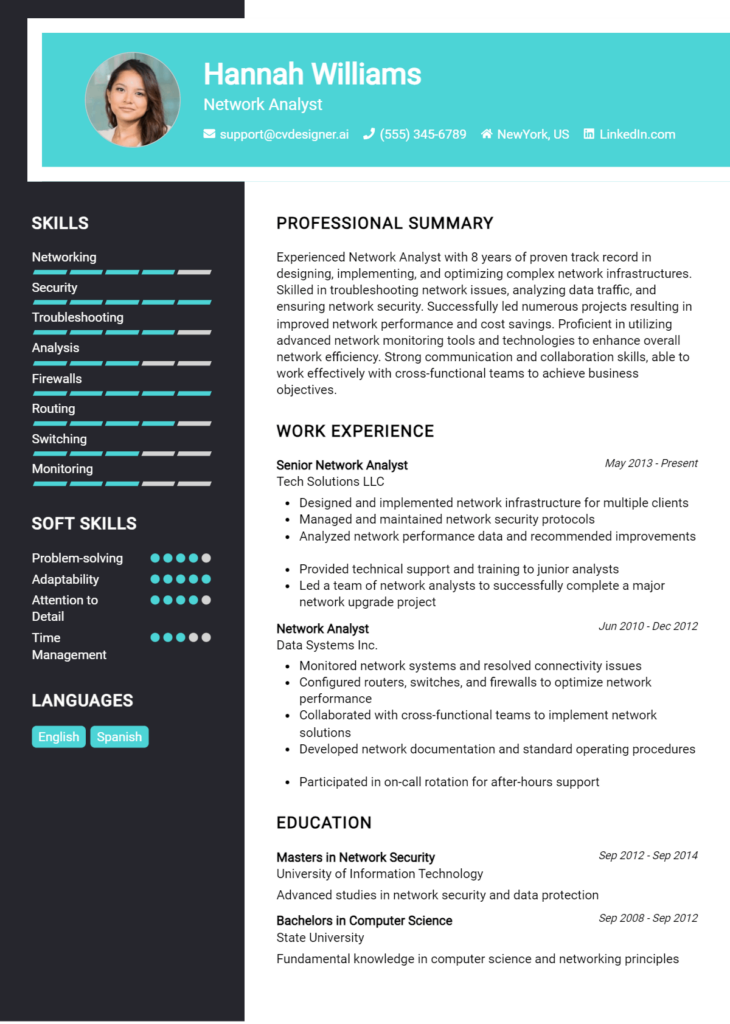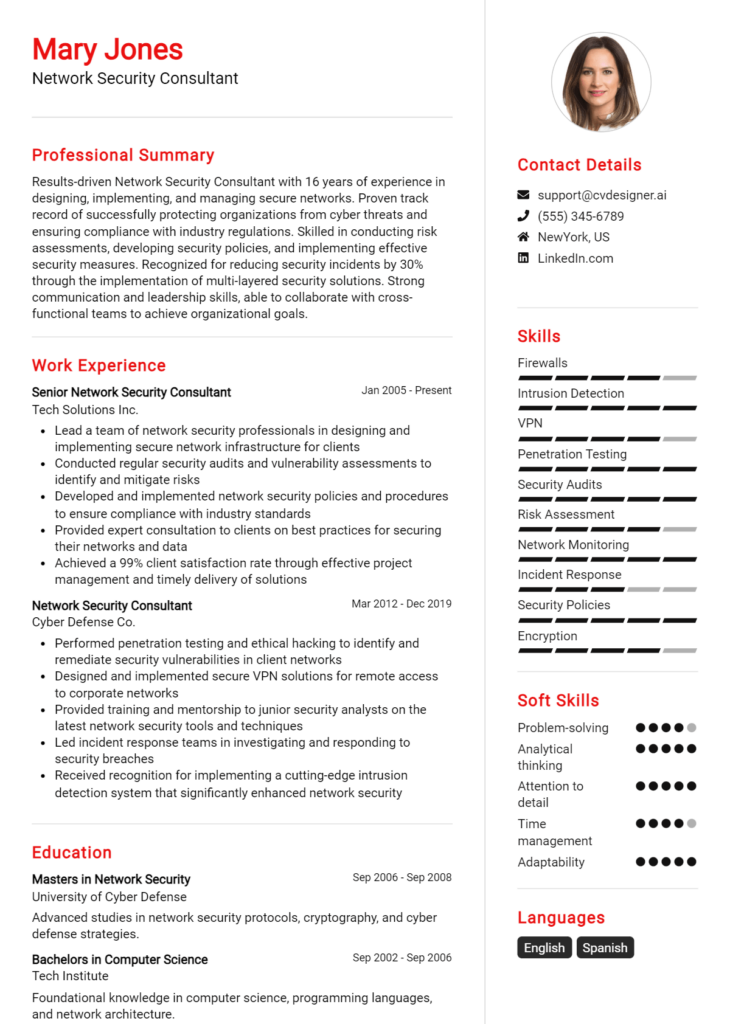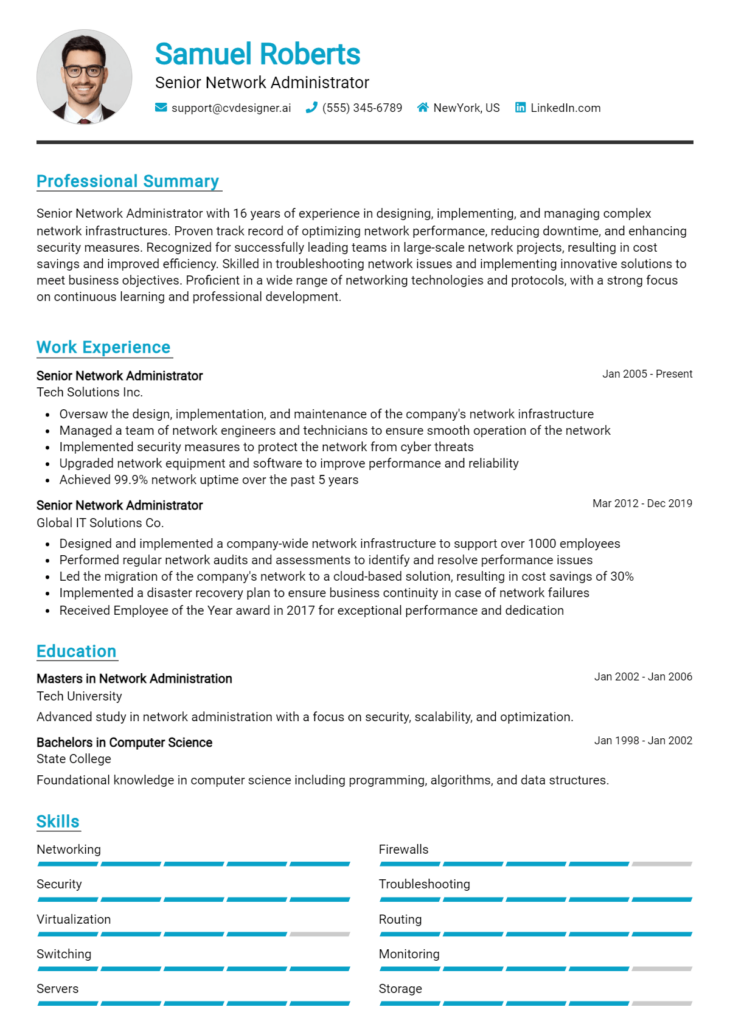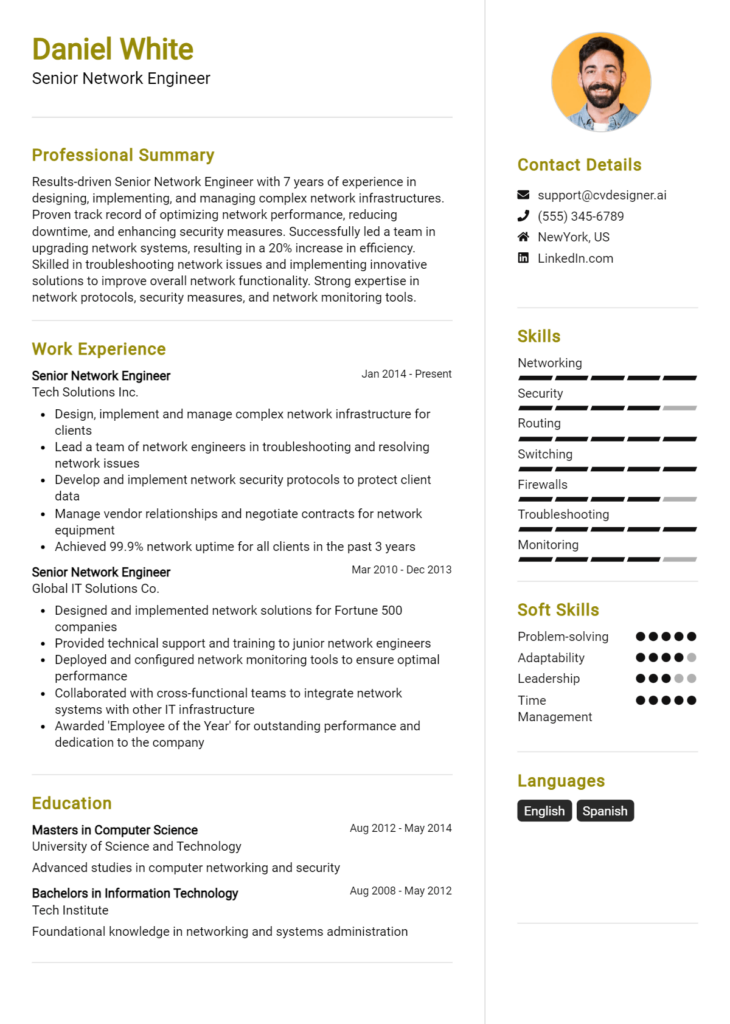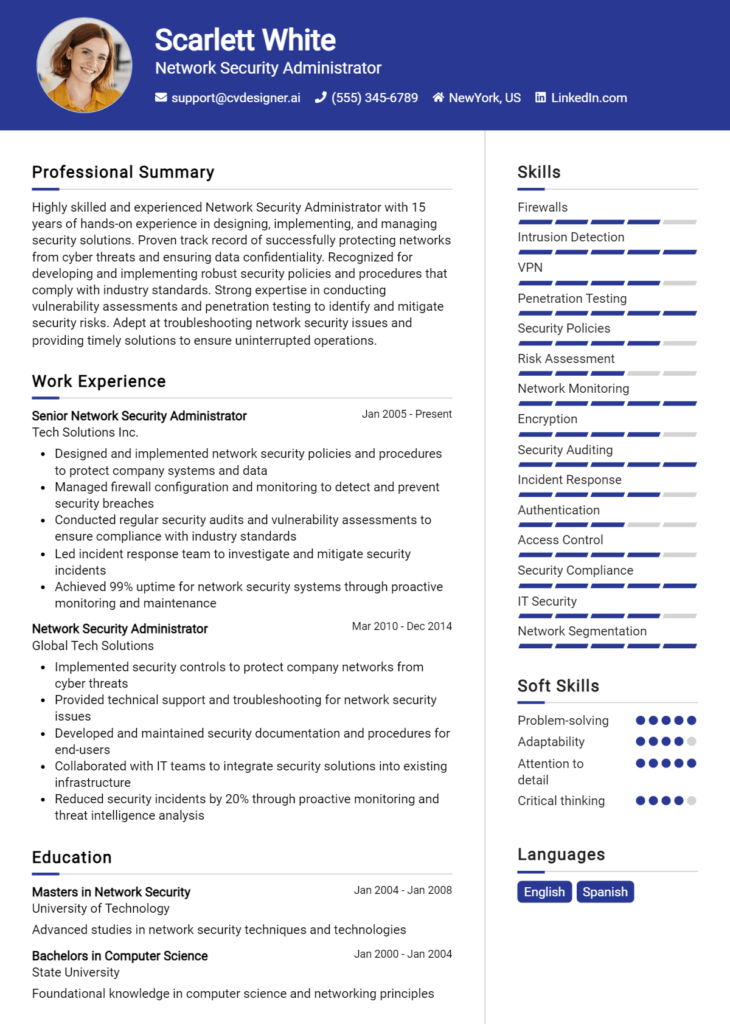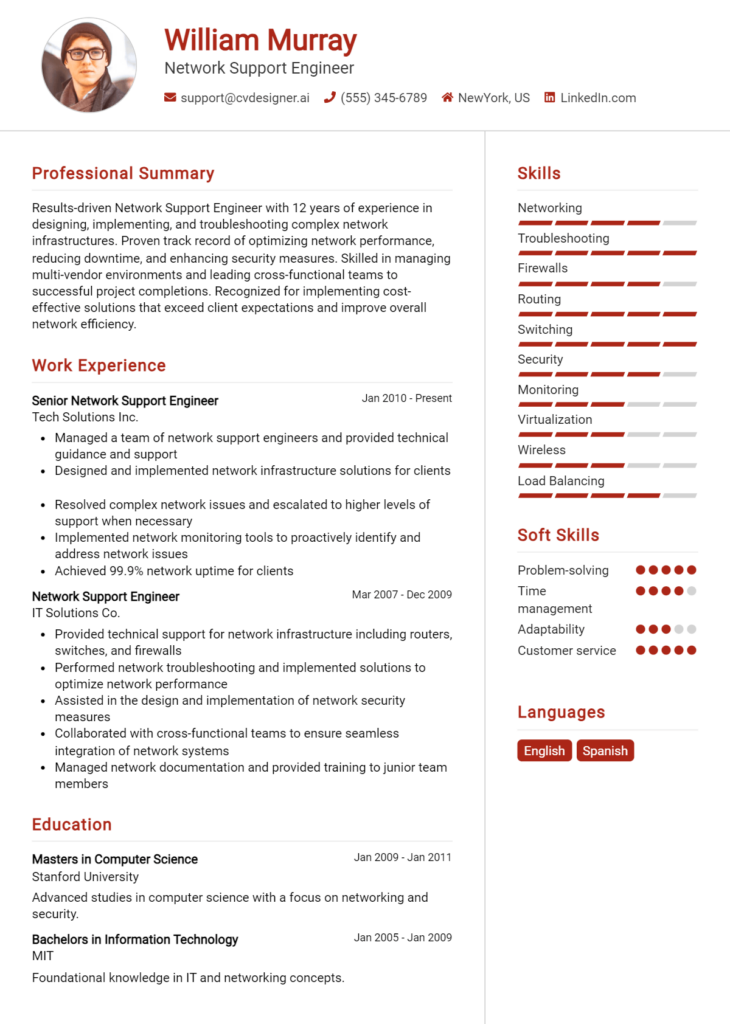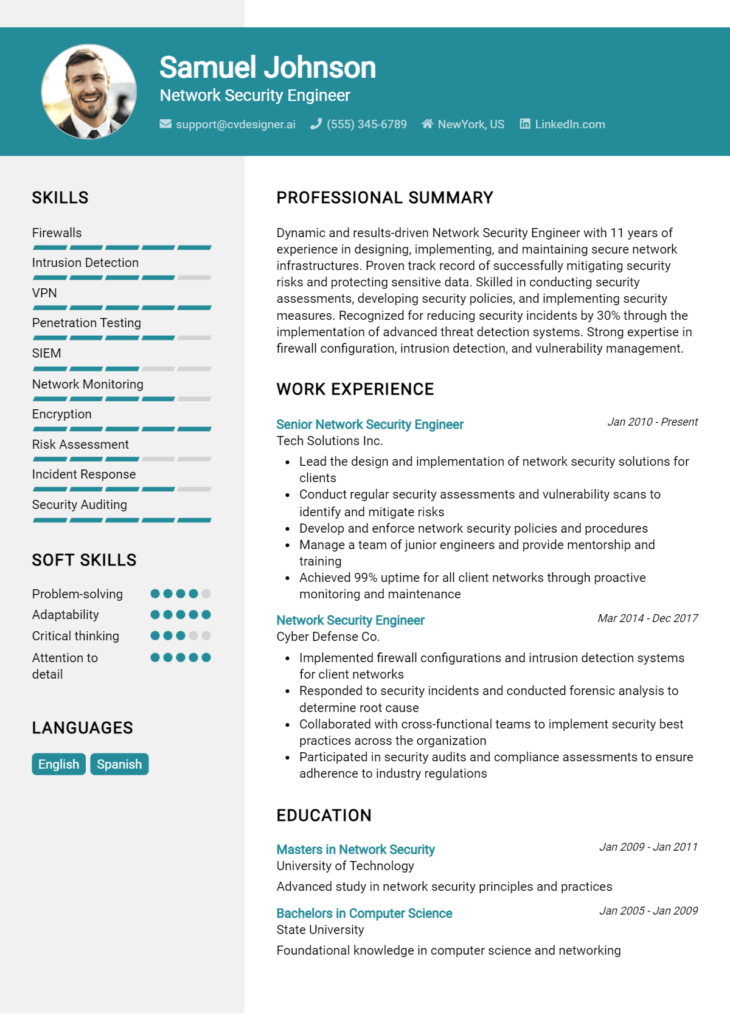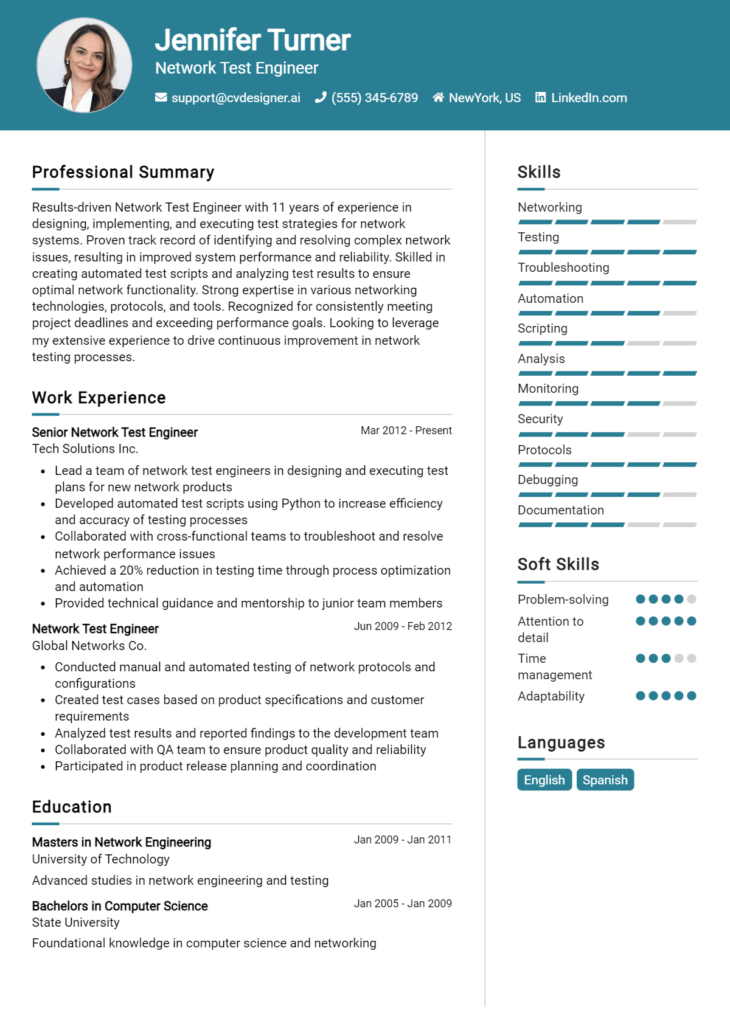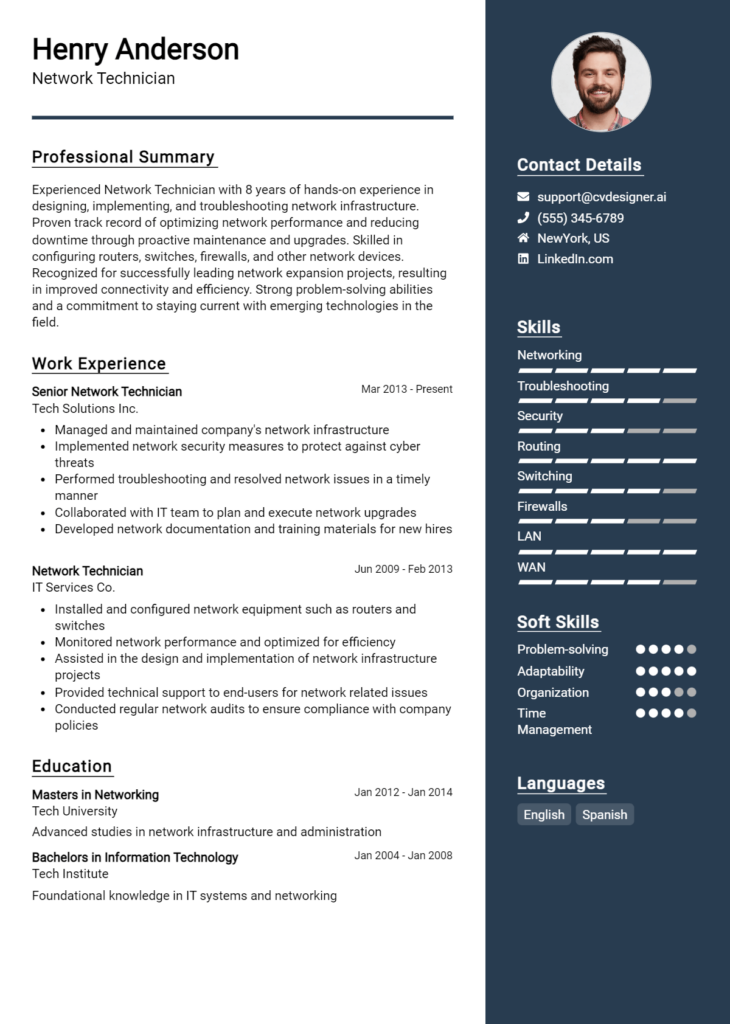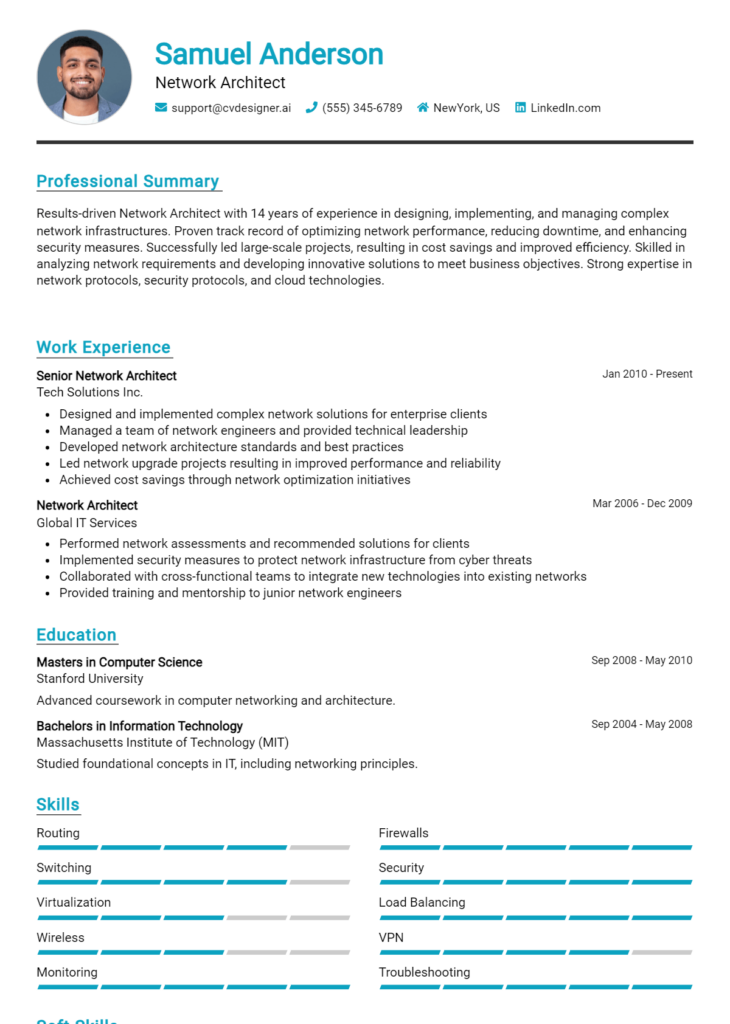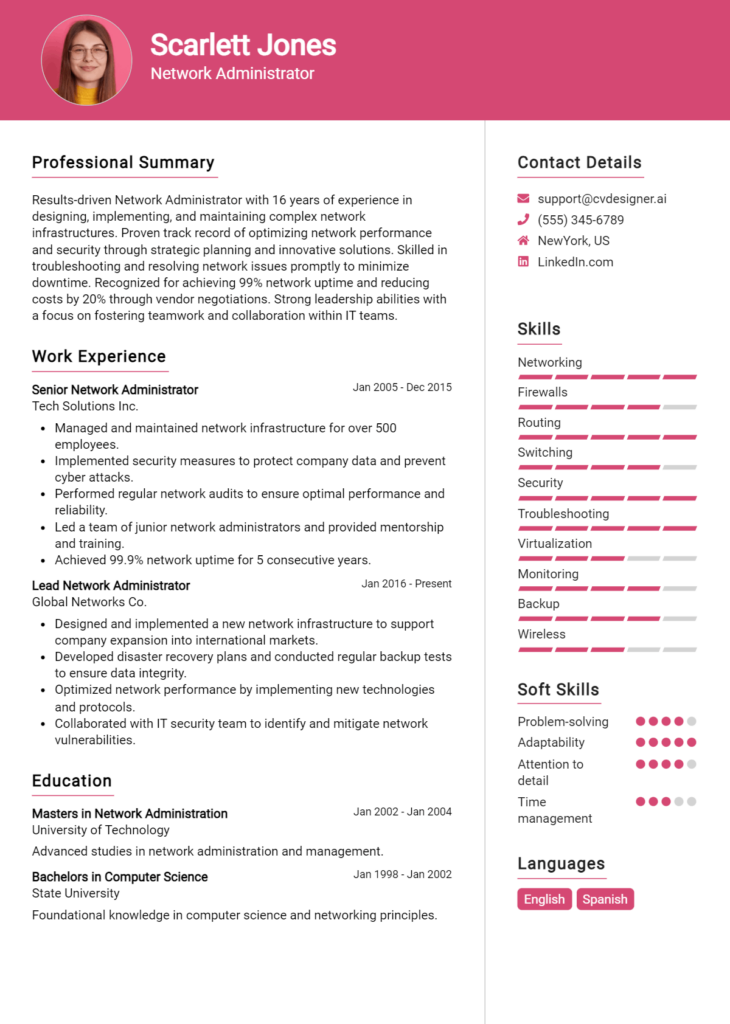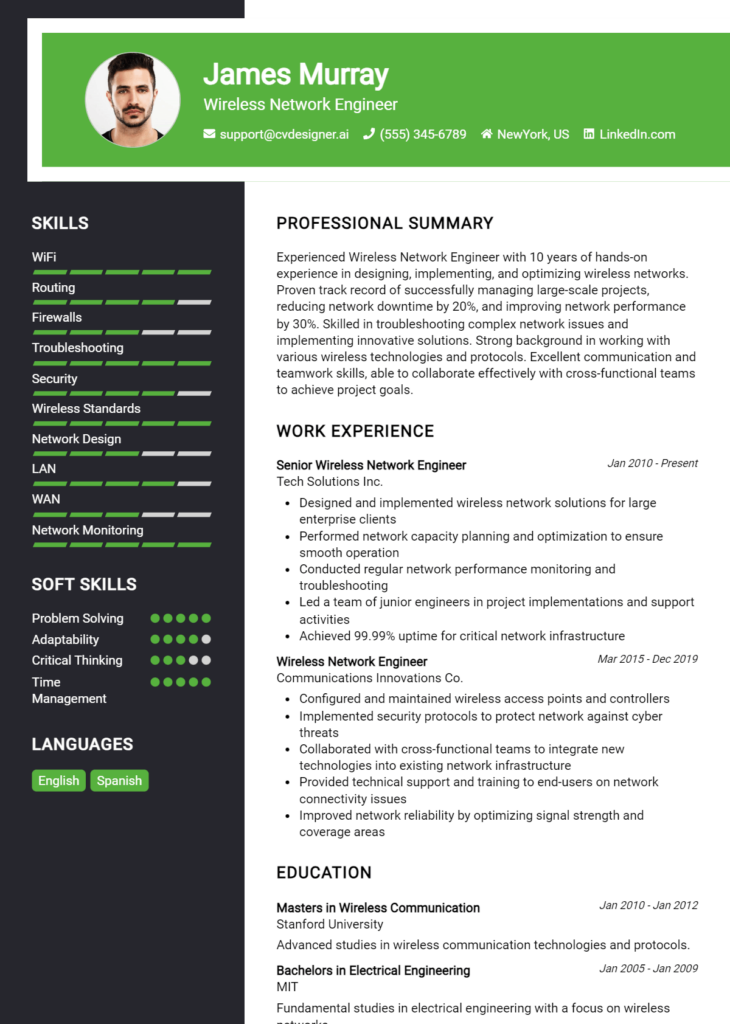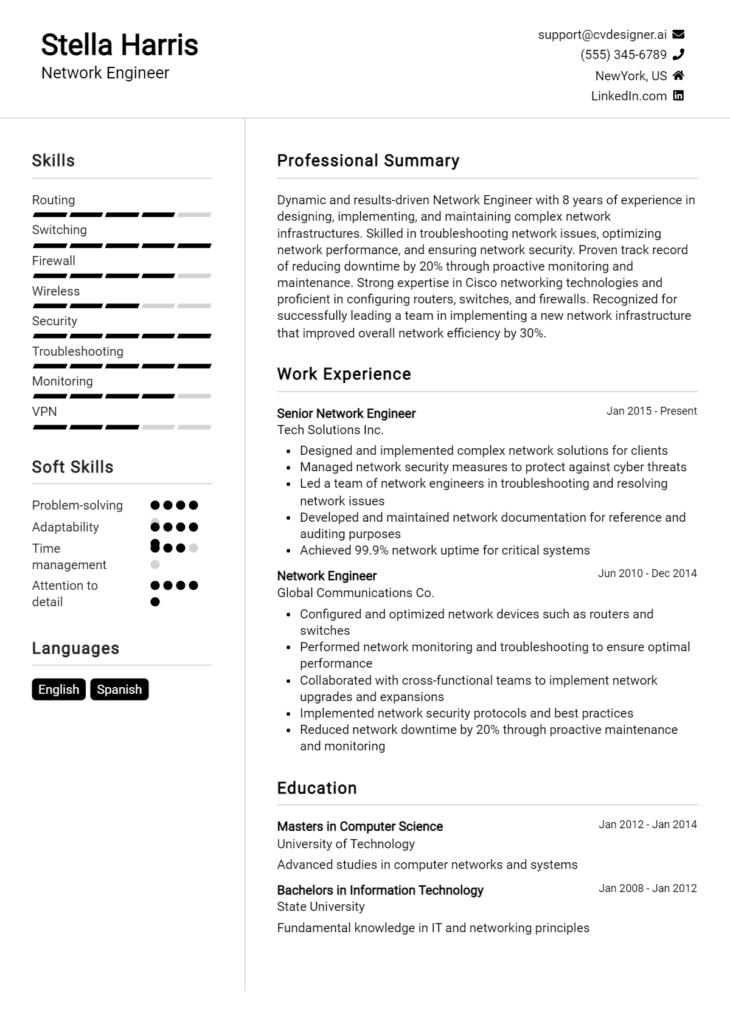Most Popular Network Security Analyst Resume Examples
Explore additional Network Security Analyst resume samples and guides and see what works for your level of experience or role.
As the digital landscape continues to expand, the role of a Network Security Analyst has become increasingly vital in safeguarding sensitive information and maintaining the integrity of organizational networks. These professionals are on the front lines of cybersecurity, tasked with identifying vulnerabilities, implementing protective measures, and responding to threats. With the immense responsibility that comes with this position, having a well-crafted resume is essential to stand out in a competitive job market. A strong resume not only highlights your technical skills and experiences but also conveys your understanding of the critical nature of network security in today’s digital age.
In this comprehensive guide to crafting the perfect Network Security Analyst resume, we will delve into the key responsibilities and skills that define this role, ensuring you understand what employers are looking for. We’ll explore the best formats to use to showcase your qualifications effectively, highlight common mistakes to avoid that could undermine your application, and provide tailored resume examples for all experience levels. Additionally, we’ll share valuable tips on resume writing techniques to elevate your document and guide you in selecting the right resume templates that align with your personal brand and the expectations of the industry. Whether you’re just starting your career or looking to advance, this guide is designed to equip you with the knowledge and resources you need to create an impactful resume that opens doors to exciting opportunities in network security.
Key Responsibilities and Skills for a Network Security Analyst
A Network Security Analyst plays a crucial role in protecting an organization’s network and systems from cyber threats. Their responsibilities include monitoring network traffic for suspicious activities, implementing security measures, and responding to security incidents. They analyze security breaches to identify vulnerabilities, develop security policies, and ensure compliance with regulatory standards. Additionally, they conduct risk assessments and provide recommendations for improvements to the network security infrastructure.
Key Responsibilities:
- Monitor and analyze network traffic for unusual behavior.
- Respond to security incidents and mitigate risks.
- Conduct vulnerability assessments and penetration testing.
- Develop and enforce security policies and procedures.
- Implement and manage security tools (firewalls, anti-virus software, etc.).
- Stay updated on the latest security threats and technologies.
- Collaborate with IT teams to ensure secure network configurations.
- Provide training and guidance on security best practices.
Essential Skills:
- Proficiency in network security protocols and technologies.
- Strong analytical and problem-solving abilities.
- Knowledge of firewalls, VPNs, IDS/IPS, and encryption technologies.
- Familiarity with regulatory compliance (e.g., GDPR, HIPAA).
- Ability to conduct risk assessments and security audits.
- Effective communication skills for reporting findings and training staff.
- Experience with security information and event management (SIEM) tools.
- Understanding of incident response and disaster recovery processes.
Highlighting these skills effectively in the resume skills section is essential for capturing the attention of hiring managers. Tailoring these responsibilities and skills to match the specific job description can significantly enhance your chances of securing an interview. Consider how each skill aligns with the requirements of the position you’re applying for, and ensure they are presented clearly and concisely. Additionally, reflecting on how these skills could be relevant in creating a strong CV will further demonstrate your suitability for the role and increase your appeal to potential employers.
Best Resume Format and Structure for a Network Security Analyst
When crafting a resume for a Network Security Analyst position, it's essential to choose a format that highlights your technical skills, relevant experience, and professional accomplishments. A well-structured resume not only grabs the attention of hiring managers but also clearly communicates your qualifications. Here’s a detailed guide on the best resume format and structure for this role.
Contact Information
- Include your full name at the top of the resume.
- Add your phone number, professional email address, and LinkedIn profile (if applicable).
- Consider including your location (city and state) but avoid a full address for privacy.
Professional Summary
- Write a brief, impactful summary (2-3 sentences) that encapsulates your experience, key strengths, and what you bring to the role.
- Tailor this section to the specific job, highlighting your expertise in network security, risk assessment, and incident response.
- Use keywords from the job description to enhance alignment with the role.
Work Experience
- List your work experience in reverse chronological order (most recent job first).
- For each position, include the job title, company name, location, and dates of employment.
- Use bullet points to describe your responsibilities and achievements, focusing on quantifiable results (e.g., “Implemented security measures that reduced incidents by 30%”).
- Highlight specific tools, technologies, and methodologies you used (e.g., firewalls, intrusion detection systems, SIEM tools).
Education
- Include your highest degree first, followed by any relevant certifications or training.
- For each educational entry, provide the degree earned, institution name, location, and graduation year.
- If you are a recent graduate, you may include relevant coursework or projects related to network security.
Skills
- Create a dedicated skills section that lists technical skills relevant to network security (e.g., network protocols, threat analysis, vulnerability assessment).
- Include soft skills that are important for the role, such as problem-solving, analytical thinking, and communication.
- Use a mix of hard and soft skills to present a well-rounded profile.
Certifications
- List any industry-recognized certifications that validate your expertise in network security, like CompTIA Security+, Certified Information Systems Security Professional (CISSP), or Certified Ethical Hacker (CEH).
- Include the certifying body and the date obtained or the expiration date if applicable.
Additional Sections (Optional)
- Projects: If you have completed significant projects related to network security, consider including a section that briefly describes them.
- Professional Affiliations: Mention any memberships in professional organizations, such as ISACA or (ISC)².
- Publications or Presentations: If applicable, include any articles, papers, or presentations you have contributed to in the field of network security.
Formatting Tips
- Use a clean, professional font (like Arial or Calibri) and keep the font size between 10-12 points.
- Utilize bullet points for easy readability and to draw attention to key accomplishments.
- Maintain consistent formatting throughout the document (e.g., alignment, font styles).
- Ensure there’s enough white space to avoid clutter, making it easier for hiring managers to skim through your qualifications.
Complementing Cover Letter The resume format you choose can complement your cover letter by maintaining consistency in font, color scheme, and overall style. Your cover letter should echo the professional tone of your resume, reinforcing your personal brand. Use the cover letter to expand on your resume by providing context to your experiences and showcasing your enthusiasm for the role. Both documents should work together to present a cohesive narrative about your qualifications and fit for the Network Security Analyst position.
By following this structured approach, you can create a compelling resume that effectively showcases your skills and experiences as a Network Security Analyst, making you stand out to potential employers.
Writing Tips and Best Practices for a Network Security Analyst Resume
When crafting a resume as a Network Security Analyst, it’s crucial to present your skills and experiences clearly and effectively. Focus on highlighting your technical expertise, problem-solving abilities, and achievements in previous roles. Utilizing a clean and professional format will enhance readability and make a positive impression on potential employers. Be sure to tailor your resume for each job application, incorporating relevant industry-specific keywords and showcasing your accomplishments with quantifiable data. For optimal results, consider leveraging resume writing tips to ensure your resume stands out. Remember, many of these practices can also be beneficial when drafting a compelling cover letter.
- Use strong action verbs such as "implemented," "analyzed," "designed," and "secured" to convey your contributions effectively.
- Quantify your achievements whenever possible, such as "monitored network traffic leading to a 30% reduction in security breaches."
- Incorporate industry-specific keywords related to network security, such as "firewall management," "intrusion detection systems," and "risk assessment."
- Highlight relevant certifications (e.g., CISSP, CEH) prominently, as they can set you apart from other candidates.
- Keep your resume concise, ideally one page, focusing on the most relevant experience and skills for the position.
- Use bullet points for easy readability, making it simple for hiring managers to scan your qualifications quickly.
- Ensure your resume is free of grammatical errors and typos to maintain a professional appearance.
- Tailor your resume to each job application by aligning your skills and experiences with the specific requirements listed in the job description.
Common Mistakes to Avoid in a Network Security Analyst Resume
When crafting a resume for a Network Security Analyst position, it’s essential to present your qualifications effectively while avoiding common pitfalls that can detract from your overall candidacy. A well-structured resume should highlight your skills and experience without overwhelming the reader with irrelevant information. Here are some common mistakes to avoid:
- Overloading with Information: Including excessive details can make your resume cluttered and hard to read.
- Using Generic Descriptions: Failing to tailor your job descriptions to the specific role can give the impression of a lack of genuine interest.
- Neglecting Keywords: Omitting relevant industry keywords can hinder your resume from passing through Applicant Tracking Systems (ATS).
- Ignoring Achievements: Focusing solely on duties instead of showcasing accomplishments can undermine your contributions.
- Poor Formatting: Using inconsistent fonts or layouts can make your resume look unprofessional.
- Lack of Focus: Including unrelated work experience can dilute your expertise in network security.
- Not Quantifying Results: Failing to provide metrics or specific outcomes of your work can leave your achievements vague.
- Grammatical Errors: Typos and grammatical mistakes can create a negative impression of your attention to detail.
- Outdated Information: Listing skills or technologies that are no longer relevant can signal a lack of current knowledge.
- Ignoring the Cover Letter: Overlooking the importance of a cover letter can result in missed opportunities to further explain your qualifications.
To ensure your resume stands out positively, consider reviewing the common mistakes to avoid in a resume. Additionally, don’t forget to look at common cover letter mistakes that should also be avoided to create a comprehensive application package.
Sample Network Security Analyst Resumes
As the demand for cybersecurity expertise continues to grow, the role of a Network Security Analyst has become increasingly vital in protecting organizations from cyber threats. Whether you are an experienced professional, an entry-level candidate, or someone looking to transition into this field, a well-crafted resume is essential for making a strong impression. Below are three sample resumes tailored to different levels of experience, demonstrating how to effectively showcase your skills and qualifications in the world of network security.
Experienced Network Security Analyst Resume Sample
John Doe
123 Cyber Lane
Tech City, CA 12345
(123) 456-7890
john.doe@email.com
Professional Summary
Results-driven Network Security Analyst with over 8 years of experience in managing and securing network systems. Proven expertise in risk assessment, incident response, and implementing security measures that enhance data protection and compliance. Strong analytical skills with a focus on threat detection and mitigation.
Skills
- Network Security Protocols (TCP/IP, VPN, Firewalls)
- Vulnerability Assessment & Penetration Testing
- SIEM Tools (Splunk, ArcSight)
- Incident Response & Forensics
- Security Compliance (ISO 27001, NIST)
- Security Architecture Design
Professional Experience
Senior Network Security Analyst
XYZ Corporation, Tech City, CA
June 2018 – Present
- Led a team in developing a comprehensive security strategy that reduced breaches by 40% over two years.
- Conducted vulnerability assessments and penetration testing, identifying critical weaknesses and implementing remediation strategies.
- Collaborated with IT departments to establish security policies and procedures in compliance with industry standards.
Network Security Analyst
ABC Technologies, Tech City, CA
January 2015 – May 2018
- Monitored network traffic for unusual activity, leading to the identification and neutralization of several threats.
- Assisted in the implementation of a new firewall system that improved overall network security and reduced downtime.
- Provided training to staff on security best practices, enhancing organizational awareness of cybersecurity.
Education
Bachelor of Science in Information Technology
University of Tech City, Tech City, CA
Graduated: May 2014
Entry-Level Network Security Analyst Resume Sample
Jane Smith
456 Security Ave
Cyber Town, CA 67890
(987) 654-3210
jane.smith@email.com
Professional Summary
Motivated and detail-oriented recent graduate with a Bachelor’s degree in Cybersecurity. Seeking an entry-level position as a Network Security Analyst to leverage academic knowledge and hands-on internship experience in network security and risk management.
Skills
- Network Monitoring Tools (Wireshark, Nagios)
- Basic Knowledge of Firewalls and VPNs
- Understanding of Security Protocols (SSL, SSH)
- Incident Response & Reporting
- Familiarity with Compliance Standards (PCI-DSS, HIPAA)
- Strong Problem-Solving Abilities
Internship Experience
Network Security Intern
Tech Solutions, Cyber Town, CA
June 2022 – August 2022
- Assisted in monitoring network traffic and identifying potential security threats.
- Participated in vulnerability scanning and contributed to documentation for remediation efforts.
- Supported the security team in conducting risk assessments and preparing compliance reports.
Education
Bachelor of Science in Cybersecurity
Cyber University, Cyber Town, CA
Graduated: May 2022
Career Changer Network Security Analyst Resume Sample
Michael Johnson
789 Transition Blvd
New City, CA 34567
(321) 654-9870
michael.johnson@email.com
Professional Summary
Dedicated IT professional with 5 years of experience in systems administration, now transitioning to a Network Security Analyst role. Strong foundation in IT infrastructure management, coupled with a passion for cybersecurity. Committed to enhancing security protocols and protecting sensitive information.
Skills
- Systems Administration (Windows, Linux)
- Network Configuration & Management
- Basic Knowledge of Cybersecurity Tools (Nessus, Metasploit)
- Risk Assessment & Management
- Strong Analytical and Troubleshooting Skills
- Team Collaboration & Communication
Professional Experience
Systems Administrator
Tech Innovations, New City, CA
March 2018 – Present
- Managed and maintained IT infrastructure, ensuring system performance and security.
- Developed and implemented backup and disaster recovery plans to safeguard critical data.
- Collaborated with the security team to enhance network security measures and reduce vulnerabilities.
Education
Certification in Cybersecurity Fundamentals
Cyber Training Institute, New City, CA
Completed: December 2022
Bachelor of Arts in Information Systems
State University, New City, CA
Graduated: May 2017
For more inspiration, explore additional resume examples that can help you tailor your application. Don't forget that corresponding cover letter examples are also available to create a complete job application package.
Checklist for a Network Security Analyst Resume
- Proofread for Errors: Carefully review your resume for any spelling, grammar, or punctuation errors. Consider reading it aloud to catch mistakes you might overlook.
- Consistency in Formatting: Ensure that your font style, size, and formatting (like bullet points and headers) are consistent throughout the document. This helps maintain a professional appearance.
- Tailor Your Resume: Customize your resume for the specific Network Security Analyst position you are applying for. Highlight relevant skills and experiences that match the job description.
- Use Action Verbs: Start bullet points with strong action verbs (e.g., "analyzed," "implemented," "secured") to convey your responsibilities and accomplishments effectively.
- Quantify Achievements: Whenever possible, include metrics and numbers to quantify your achievements (e.g., "Reduced security breaches by 30% through proactive monitoring").
- Highlight Relevant Skills: Clearly list technical skills pertinent to network security, such as knowledge of firewalls, intrusion detection systems, and encryption protocols.
- Include Certifications: Mention any relevant certifications (e.g., CISSP, CEH, CompTIA Security+) that demonstrate your expertise and commitment to the field.
- Keep It Concise: Aim for a clean and concise resume that ideally fits on one page. Remove any unnecessary information that does not directly relate to the job.
- Seek Feedback: Consider asking a mentor or colleague in the cybersecurity field to review your resume and provide constructive feedback.
- Consider Using an AI Resume Builder: Use an AI resume builder to ensure all elements are well-organized and visually appealing.
A similar checklist can be followed for creating a CV to ensure it meets the necessary standards and effectively showcases your qualifications.
Key Takeaways for a Network Security Analyst Resume Guide
Creating a compelling resume as a Network Security Analyst requires a strategic approach that highlights your technical skills, certifications, and relevant experience. By utilizing the examples and tips provided, you can craft a resume that not only showcases your qualifications but also stands out to potential employers. To take the next step in your job application process, consider downloading a professional resume template from resume templates or a tailored cover letter template from cover letter templates. Additionally, you can streamline your resume creation with our user-friendly resume maker. Start building your pathway to success in the field of network security today!
